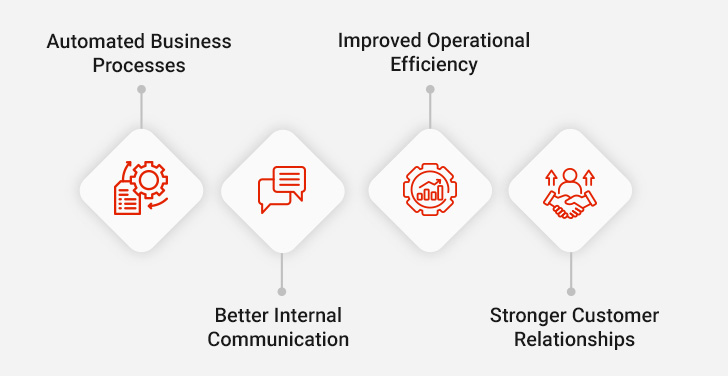Managing all the tasks manually is challenging, especially in an industry like insurance, which is highly document-intensive. However, with the introduction of digital technologies, the entire focus has shifted to a new business model that aims to boost efficiency and increase the ROI of the insurance businesses. With the increasing volume of business pouring in every day, insurance businesses face a tough time in optimizing operations. To mitigate inefficiencies and boost business productivity, most insurers now use insurance agency software.

These insurance agency systems provide a complete view of tasks, sales, agent activities, account information, etc., for all stakeholders. Moreover, workflow automation enables insurance agents to keep their records in a single database and provide services through a unified platform. Such consolidated insurance management system mitigates the need for multiple accounting algorithms and enables efficient management of client communications, databases, and documentation without requiring extensive manual intervention.
Whether for small agencies or large enterprises, these solutions are equipped with capabilities that add more time to each workday for insurers.
Role of Insurance Software Systems

Exploring the Importance of Comprehensive Insurance Systems
Let us explore why a comprehensive insurance system is a necessity for insurance businesses in this digital age.
1. Dashboard Management
Insurance agency software provides a snapshot of the agents’ time, productivity, commissions, and workflows. The insurance agent system lends transparency to monthly sales, pipeline statuses, and accounts. Having everything at-a-glance eases the work for the agent to identify trends, reduce errors and omissions (E&O), and even spot potential fraud. This eventually leads to more business and drives better results in terms of efficiency and productivity.
Additionally, the dashboards act as an impartial and unbiased platform that offers a viewpoint for analyzing the business’ overall performance. Dashboards provide real-time insights, track key metrics, and highlight trends, enabling teams across departments to make data-driven decisions and stay aligned with the organization’s objectives. By centralizing data in one place, dashboards also help identify areas for improvement and opportunities for growth, supporting continuous optimization across the business.
2. Efficient Documentation
Efficient documentation is crucial for improving the efficiency of insurance business workflows. Insurance systems organize all the data into a single interface, including multiple carrier submissions, quotes and downloads, payments, ACORD forms, and templates to help agents create new policy packages. With a single dashboard, customer data is always accessible. Without a well-managed dashboard system, countless hours are lost in gathering information across various carrier websites. It also streamlines the sales and leads management process efficiently.
Apart from improving document accessibility and data quality, an insurance solution also minimizes the risks of cyberattacks and data theft. These systems add a layer of security via administrator access and granular permission controls, empowering insurance businesses to control data access with stakeholders.
3. Market Automation
Market automation is an essential tool to improve customer retention and increase lifetime value. The insurance solution strengthens relationships to improve customer satisfaction with well-managed customer data and perfectly timed communications.
Modern insurance systems are equipped with set campaigns to guarantee higher customer satisfaction, improved renewal rates, and greater opportunities to up-sell and cross-sell. All this occurs with least manual effort by the power of automation. Thus, insurers significantly cut down staffing costs and free up the agents’ time to work on generating more value. Moreover, insurance businesses use a single solution for combining their sales and marketing automation efforts.
4. Customer Satisfaction
In the insurance industry, customer service is the essence of sales and marketing. For establishing long-term relationships with customers, insurance businesses must focus on fulfilling customer needs at every phase of their individual journeys.
With an insurance system, the entire customer data is easily accessible. The right data insights on a single screen are optimized for the efficient functioning of the insurance businesses. So, when client data is properly collected and maintained, insurers accurately predict customer needs and even prevent issues. Customers are better satisfied with a digital system as it eases claims filing, tracking & updating policies, and even pushes reminders for renewals. As such, satisfied customers earn loyalty to the insurance agency.
Optimize Customer Experience with Our Insurance System
5. Accounting and Reporting
Organizing reports is yet another time-consuming and mundane task for insurance agents. Insurance agency systems track the payments and invoices along with monitoring the extent of damage. The insights from the data collected like notes, records, and detailed account histories of leads and customers are time-stamped and easily accessible from a single searchable dashboard. As such, insurance software improves accuracy by providing real-time efficiency in reporting for data analysis. The reports are simply generated with automated features for regular profit tracking of individual policies. As a result, efficiency is boosted with analytical insights driven by automation of the insurance solution.
In essence, software for insurance companies not only streamlines complex accounting and reporting processes but also improves overall efficiency through real-time tracking and analysis. Automating these activities helps agents put more hours back into their day. They can devote more time to other high-value tasks to promote business growth.
Conclusion
The most basic function of an insurance system is to make things easier for insurers by automating mundane, manual tasks. The quicker the implementation of the software, the more business the insurance agencies gain. The best insurance systems are those that save an incalculable amount of time, money, frustration, and lost business. And, therefore, investing in the right solution is important.
Case in Focus
A multinational insurance organization dealing with various types of insurance including health, life, and travel, was in dire need of modernizing core systems. The client’s home-grown legacy system was incompatible with modern technologies and contributed to inefficiencies. The client partnered with us to modernize their existing insurance system for seamless synchronization. As a result of the modernization, the insurer was able to reduce technology maintenance costs and business process unit costs by 15% and 20% respectively. See the full case study to learn all the details of the insurer’s modernization journey.





